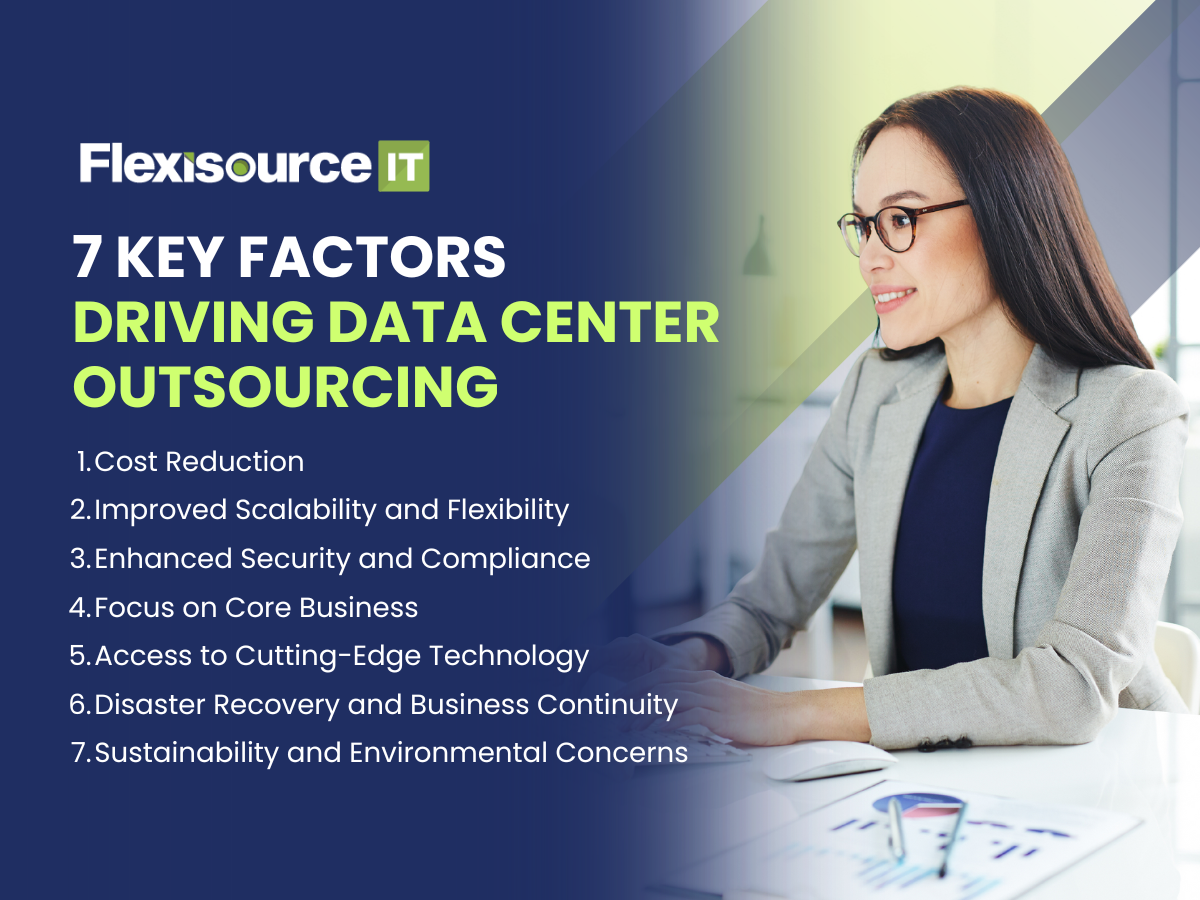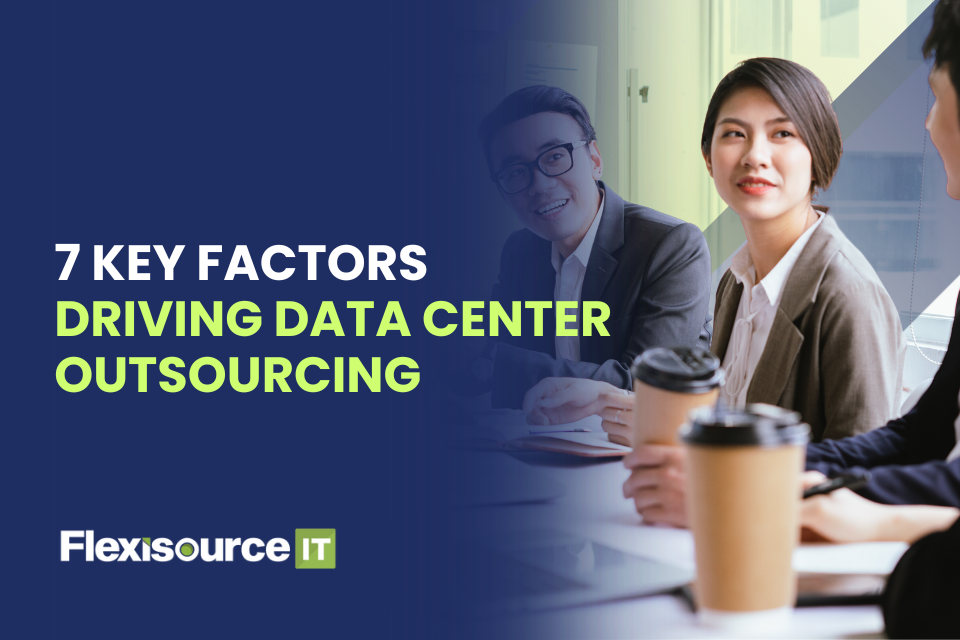Data center outsourcing, also known as DCO, is the process of hiring management and operation services for your data to a third party. It should not be confused with colocation, wherein a company hosts its hardware in a data center.
A business’s IT infrastructure must be maintained so that it continues to provide seamless daily functions with no room for error. Should there be a gap between its progress, swift problem-solving must occur. Managing a business’ data is time-consuming. Maintenance, upgrades, and lack of sustainability can halt productivity. This is why many companies are now gearing towards data center outsourcing.
Table of Contents
What is the role of data centers in managing critical IT infrastructure?
The delegation of daily operations within data centers is critical to continuing professional services and other business needs. Database services include storage, security, processing, and distribution. Their role is to ensure the data stored within a business function is secure and updated regularly.
Three types of data centers benefit a brand’s progress: colocation, cloud, and on-premises. Data center outsourcing provides relief from the heavy load required of a business for its data.
5 Types of Data Centers
Data center outsourcing isn’t a singular unit. There are different types of data centers that businesses and IT experts can investigate for relief on maintenance.
Colocation
Colocations are a type of data center outsourcing in which IT teams rent the equipment, bandwidth, and workspace of a data center. This relieves the burden on businesses of having to shoulder the economic repercussions and expenses of owning the equipment necessary to protect their data.
Enterprise
Enterprise data centers aren’t outsourced. They’re owned completely by the company, and processing and applications are done on their own. This means that the company shoulders its own maintenance, security, and IT infrastructure.
Cloud
Cloud data centers are virtual. Meaning there is no physical location where you can visit it. Think of cloud data centers as the virtual version of colocation data centers. They usually have specific services that can be done remotely without hardware or self-configuration.
Edge Data Center
Edge data centers are smaller versions of data centers that are spread out and separated to prevent lagging and minimise latency. They’re usually used to deploy edge computing facilities.
Micro Data Center
An even smaller version of a data center is the micro data center. They’re less popular than outsourcing data centers, enterprises, or colocations. However, they’re conveniently located in small spaces such as office rooms.
7 Key Factors Driving Data Center Outsourcing
Outsourcing your data center to a third-party company has many benefits. Below are 7 key factors that persuaded most businesses to hire outsourced services for their IT infrastructure.

Cost Reduction
The biggest reason for outsourcing data center maintenance and building is the reduced capital expenditure. Operational costs such as cooling, staffing, electricity, and rent are saved and can be used to expand the business in other ways.
Prices for outsourcing vary. Some use cloud computing, being paid on an annual, daily, or monthly basis.
Improved Scalability and Flexibility
The process of web migration can be daunting to businesses not equipped with the knowledge to scale their growth to a larger size. Businesses naturally evolve when producing exemplary results. Consistent scalability and flexibility are required to ensure that your data infrastructure won’t be compromised.
Data center providers continuously monitor the growth of technology advancement and expertise. This ensures high-quality and up-to-date services for your data operations while providing adjustments.
Enhanced Security and Compliance
Depending on the company’s requirements, data center outsourcing provides perfectly managed IT services. Data center providers must have advanced security programs and certifications for compliance. Utilise their services and reduce in-house security maintenance. This will relieve your in-house experts of the burden and allow them to expand their focus on other matters within the business.
Focus on Core Business
Data center outsourcing doesn’t just benefit in-house IT experts.
Reducing the tasks required of your employees allows them to focus more on innovation and core business-related activities. It allows the IT employees to collaborate with other departments of your business to create more products and services by freeing up their time from the complexity of managing the IT infrastructure.
Access to Cutting-Edge Technology
Data center outsourcing requires data center migration. While the process may sound heavy, the return is priceless. Data center technologies and infrastructures provided by the outsourced party are of the highest quality and are gradually evolving.
Regardless of what a brand is providing, advanced IT solutions are always beneficial. Seamless functions provided by cutting-edge technology ensure customer experience and overall quick solutions to any processes that require maintenance.
Disaster Recovery and Business Continuity
The data center outsourcing companies have disaster recovery plans that safeguard your business and allow quick resumption. Some companies may opt to provide their solutions and maintenance for their data. However, there are no foolproof security measures.
The worst possibility is that your data becomes corrupted. However, outages are also a cause for concern. You may find yourself losing income and productivity, and in the worst-case scenario, end up losing the business altogether with repeated outages. Fixing the issues alone by an in-house team of IT experts may extend the time for such disasters and could bring the business closer to fatal errors.
Data center outsourcing companies will have disaster recovery plans that minimise downtime, eradicate redundancies, and secure your data.
Sustainability and Environmental Concerns
The sustainability of a business regarding environmental concerns involves not just the business in general but the world itself. Reducing GHG emissions produced from electricity is a big benefit to the environment.
The consumption of electricity on a single desktop could emit 70g of carbon dioxide alone, which is an environmental impact. Reduce your company’s carbon footprint by utilising data center operations and minimising the total emissions your business creates.
Data centers are also aware of the amount of GHG emissions produced from electricity. As a result, they tend to invest largely in energy-efficient technologies to reduce their own carbon footprint.
Conclusion
Data center outsourcing is convenient, cost-efficient, secure, environmentally friendly, and productive in the long run. Its growing trend has produced impressive results compared to companies that still maintain their data.
Redundancies, outages, and maintenance are taken care of by database services in outsourcing which allows further expansion and growing collaboration between the IT team and other departments of a business.
The overall convenience of hiring data centers outweighs in-house maintenance. Business owners and IT experts interested in data center outsourcing can expect to grow their business comforted by the thought of continuous productivity with reliable services.
Pamela is a full-time content writer and a lifelong Philomath. Her previous experience as a research analyst made her passionate about traveling the world and understanding how it works. During her day off, you can often find her indoors, writing stories or oil painting.


